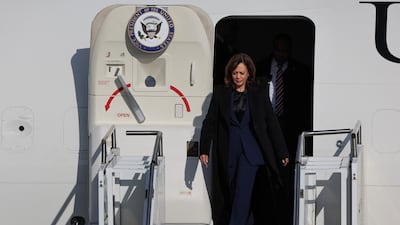This time last year, diplomats and security officials from Europe, the US and a number of other countries were gathering in Germany for the Munich Security Conference, with questions about the possibility of a Russian invasion of Ukraine. The Americans pre-empted the meeting with the release of intelligence it said proved without any doubt that the decision had been made in Moscow. With the American Vice President Kamala Harris giving a main address, she declared the US and its European allies were “united” in their response to a potential war.
Despite questions about intentions and central Europe’s nervousness about escalating with Moscow, a week later, war on mainland Europe had started.
On Friday, the Munich Security Conference kicks off once again and the war continues. Ukraine will be dominating the agenda, and Ms Harris, German Chancellor Olaf Scholz, French President Emmanuel Macron and British Prime Minister Rishi Sunak are all expected to be in attendance, declaring their support for Ukraine. The future of Nato, and weapons supplies to Ukraine, will also be discussed in a number of sessions. However, Turkey, which continues to hold up the membership of Sweden and Finland in Nato, will not be represented as the government deals with the fall out of the tragic earthquake and senior officials have withdrawn from the programme.

While a public declaration of “Western unity” is to be expected, questions about how the Ukraine war ends and how much longer both sides can sustain it are unlikely to be answered.
Of note is the absence of any Russian officials – this year they have not been invited and last year they chose not to attend. Similarly, as hopes for an Iran nuclear deal fade and protests continue in Iran, Iranian officials are not present. Rather, there are representative of the opposition from both countries speaking at the conference this weekend. Also of note is the participation of Reza Pahlavi, the son of the last Shah of Iran, who will speak in a town hall on Iran.
Meanwhile, China and the need to co-operate with Beijing is on the agenda. Beijing will be represented by a number of participants, including Wang Yi, State Councillor and Minister of Foreign Affairs, speaking in a session entitled ‘China in the World’, while another side event is entitled ‘In need of China: Smart Co-operation for Bolder Climate Action’.
There will also be a strong representation from the Middle East, with the Prime Ministers of Iraq Mohammed Shia Al-Sudani, President of Yemen, Rashad Al-Alimi, and several Arab foreign ministers attending. However, the Prime Minister of Tunisia Najla Bouden Romdhane will not be participating in person, as she and others heading to Munich risk getting caught in the disruption of Friday’s airport strikes across Germany. While geopolitics and hard security take up the bulk of sessions in Munich, it is the economy, cost of living crisis in Europe and economic fragility of a number of countries represented in the security conference that are likely to have the biggest effect on world in the coming year.


